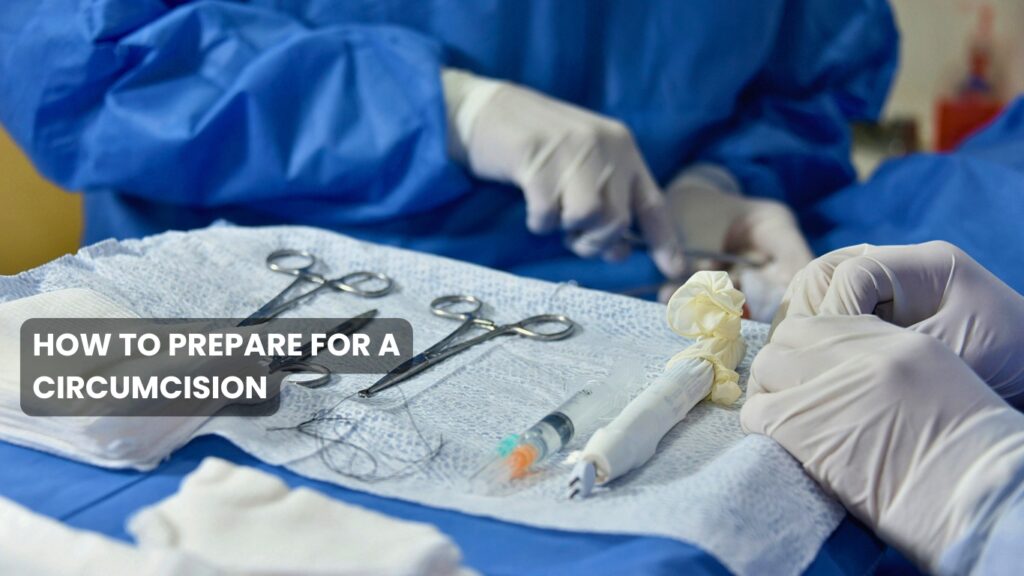What is circumcision?
Circumcision is a medical procedure involving the removal of the foreskin, which is the tissue covering the head of the penis. This procedure can be performed for various reasons, including cultural, religious, and health-related considerations. In a broader sense, what does circumcise mean? It simply refers to a person who has undergone the removal of the foreskin during circumcision surgery.
While many parents consider infant circumcision for their newborns—often referred to as circumcision infant—others opt for the procedure later in life. It’s important to note that circumcision is a well-established surgical procedure that should be performed by a qualified professional. For those residing in metropolitan areas, such as New York, seeking a Circumcision doctor in New York can provide access to specialized expertise and modern techniques.
Pros and Cons of Circumcision
Deciding on circumcision involves carefully considering the pros and cons of circumcision. Whether it’s performed as an infant circumcision or later in life, understanding both the benefits and drawbacks is essential for making an informed choice.
Pros of Circumcision
Many choose circumcision for several key reasons:
- Health Benefits: Research indicates that circumcision may reduce the risk of urinary tract infections, certain sexually transmitted infections, and even penile cancer. These potential health benefits are a primary reason for opting for circumcision surgery.
- Improved Hygiene: Without the foreskin, cleaning becomes more straightforward, potentially reducing the risk of infections. This clarity on what does circumcised mean can provide peace of mind regarding personal care.
- Cultural and Religious Significance: For many families, circumcision is an important cultural or religious ritual. In these cases, the decision often aligns with deeply held traditions.
- Simplicity in Infant Care: Parents who decide on infant circumcision or circumcision infant—often report that the procedure is simpler for newborns, with faster healing and a lower likelihood of complications compared to later in life.
Cons of Circumcision
There are also several potential drawbacks to consider:
- Surgical Risks: As with any circumcision surgery, there are risks, including infection, bleeding, or complications from anesthesia. Although these risks are generally low, they should be weighed carefully.
- Pain and Recovery: While modern techniques aim to minimize discomfort, pain during the recovery phase remains a consideration. This is particularly important when the procedure is not performed as an infant circumcision, as older individuals might experience a more challenging recovery.
- Ethical and Personal Considerations: Some individuals and families debate the ethics of circumcision, especially when performed on infants who are unable to consent. This discussion can be a significant factor for those weighing their options.
- Potential Impact on Sensitivity: There is an ongoing discussion about whether circumcision may lead to changes in penile sensitivity. This potential drawback is something many consider when evaluating the overall benefits and risks.
For those looking to explore further or considering the procedure, consulting with a Circumcision surgery New York can provide personalized insights and help address any concerns based on current medical practices and research.

How to Prepare for a Circumcision
Proper preparation is key to ensuring a smooth procedure and optimal recovery. If you’re considering infant circumcision or undergoing the procedure as an adult, start by consulting with a qualified professional. For those in urban areas, scheduling an appointment with a Circumcision doctor in New York can offer tailored advice and clarity on the process. Preparation typically involves:
- Medical Consultation: Discuss your medical history, any medications, and specific concerns with your healthcare provider. This is essential whether you’re planning circumcision surgery for an infant or for yourself.
- Pre-Procedure Instructions: Follow any fasting or hygiene instructions provided by your doctor, as these help reduce the risk of complications during the surgery.
- Understanding the Procedure: Learning what does circumcised mean and what the process entails can help set expectations and alleviate concerns about the surgery and subsequent recovery.
How a Circumcision is Performed
The procedure itself is generally straightforward and performed under sterile conditions in a clinical setting. For both infant circumcision (often referred to as circumcision infant) and adult circumcision, the steps typically include:
- Anesthesia: Local or general anesthesia is administered to ensure comfort throughout the circumcision surgery.
- Surgical Technique: The surgeon carefully removes the foreskin from the penis. The specific method may vary depending on the patient’s age and any individual health considerations.
- Sterile Environment: The procedure is performed in a sterile setting to minimize the risk of infection and other complications.
- Immediate Outcome: After the foreskin is removed, the area is cleaned and bandaged, and the patient is provided with detailed post-operative instructions to promote healing and manage discomfort.
What are the Benefits of Circumcision?
Circumcision offers several potential benefits that influence the decision-making process:
- Improved Hygiene: Without the foreskin, maintaining cleanliness can be easier, reducing the risk of infections.
- Reduced Health Risks: Studies suggest that circumcision can lower the risk of urinary tract infections, certain sexually transmitted infections, and even penile cancer. This contributes significantly to the pros and cons of circumcision.
- Cultural and Religious Importance: For many families, circumcision is more than a medical procedure—it’s a vital cultural or religious tradition that plays an important role in community identity.
- Simplicity in Infant Care: When performed as an infant circumcision, the procedure typically results in a faster healing process with fewer complications, contributing to overall improved long-term outcomes.
What are the Risks or Complications of Circumcision?
Like all surgical procedures, circumcision does carry potential risks and complications that should be considered:
- Surgical Risks: As with any circumcision surgery, there is a risk of infection, bleeding, or adverse reactions to anesthesia. Although these risks are relatively low, they are important to discuss with your healthcare provider.
- Pain and Discomfort: Post-operative pain is a common side effect. While pain management strategies are available, individuals undergoing circumcision—especially beyond the infant circumcision stage—may experience a more challenging recovery.
- Possible Changes in Sensitivity: Some studies and anecdotal evidence suggest that there may be changes in penile sensitivity after the procedure. This factor is often debated and considered part of the pros and cons of circumcision.
- Ethical Considerations: For many, especially in cases involving circumcision infants, the ethical considerations around consent and personal choice are an important aspect of the decision-making process.

Follow-up and Recovery After Circumcision
Post-operative care is crucial for a successful recovery and to minimize the risk of complications. Here’s what you can generally expect:
- Follow-Up Appointments: Regular check-ups with your healthcare provider are essential to monitor the healing process. If you have chosen circumcision surgery for yourself or as an infant circumcision, these appointments help ensure that the site is healing properly.
- Care Instructions: Detailed care instructions will be provided, including guidelines for keeping the area clean, managing pain, and recognizing signs of infection.
- Activity Restrictions: To promote healing, it is important to avoid strenuous activities or any actions that may disrupt the surgical site.
- Healing Time: Recovery times can vary. Infants typically heal faster than adults, but both require careful observation during the initial days and weeks following the procedure.
- Long-Term Follow-Up: Especially when questions arise about what does circumcised mean in terms of long-term outcomes, continued dialogue with your Circumcision doctor in New York or your healthcare provider ensures that any concerns are promptly addressed.
Frequently Asked Questions
How long does a circumcision take to heal?
The healing time after circumcision surgery can vary based on age and individual health. For newborns undergoing infant circumcision—or circumcision infant—the recovery is typically faster, with healing usually completed within 7 to 10 days. In older children or adults, healing may take up to 2 to 3 weeks. It’s important to follow post-operative care instructions provided by your Circumcision doctor in New York or other healthcare provider to ensure a smooth recovery.
Does circumcision reduce sensitivity?
The impact of circumcision on sensitivity is a frequently discussed aspect of the pros and cons of circumcision. While some studies suggest there may be a decrease in sensitivity due to the removal of the foreskin, others indicate that the difference might not significantly affect overall sexual pleasure. Understanding what does circumcised mean in terms of nerve endings and tissue removal is key to interpreting these findings. Ultimately, individual experiences can vary, and discussing concerns with your healthcare provider can help you better understand the potential outcomes.
Does circumcision affect fertility?
Research indicates that circumcision does not affect fertility. The procedure involves the removal of the foreskin and does not interfere with the reproductive organs or hormonal balance. Whether the procedure is performed as infant circumcision or later in life, studies have shown that fertility remains unaffected, ensuring that the ability to conceive is not compromised by circumcision surgery.
Does circumcision affect sexual function or pleasure later in life?
This question is often part of the pros and cons of circumcision debate. Many studies have found that circumcision does not significantly affect sexual function or pleasure later in life. While some individuals report a change in sensation, most evidence suggests that overall sexual performance, satisfaction, and function remain intact. For anyone with concerns regarding these outcomes, consulting a Circumcision doctor in New York or a trusted healthcare provider can offer personalized insights based on the latest research.
How should I care for my baby after circumcision?
Proper care after infant circumcision is crucial for a smooth recovery. Here are some general guidelines for caring for a circumcision infant:
- Keep the Area Clean: Follow the specific cleaning instructions provided by your healthcare provider to prevent infection.
- Monitor for Signs of Infection: Watch for any redness, swelling, or unusual discharge. If you notice any signs of infection, contact your healthcare provider immediately.
- Manage Discomfort: Your doctor may recommend pain relievers or soothing creams to ease discomfort.
- Follow-Up Appointments: Ensure that you attend any scheduled follow-up visits with your Circumcision doctor in New York or another pediatric specialist to monitor healing.
- Gentle Handling: Be gentle during diaper changes and avoid any vigorous cleaning around the surgical site until it has healed.

